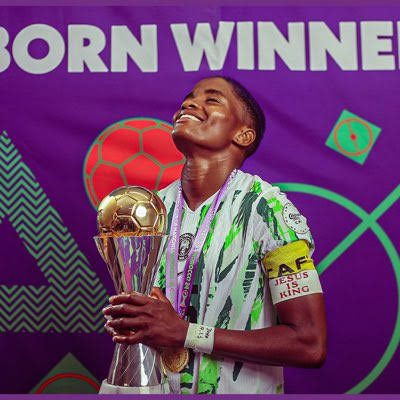Super Falcons’ $100,000 Reward: Justified honour or excessive gesture?
By Kamal Tayo Oropo, News Agency of Nigeria (NAN)
When the final whistle blew at the Prince Moulay Abdellah Stadium in Rabat, Morocco, on Saturday, July 26, 2025, the Super Falcons of Nigeria stood triumphant.
They had edged host Morocco 3–2 in a thrilling final, capturing their record-extending 10th Women’s Africa Cup of Nations (WAFCON) title.
Jubilant scenes followed across Nigeria — from Lagos, Imo, and other states street corners to social media timelines — with widespread praise for the team’s resilience and brilliance.
But beyond the celebrations, a national debate began: did the government go too far in showering the players with the amount of rewards they got ?
Each Super Falcons player was awarded a $100,000 cash bonus, house, new SUV, national honour, and additional gifts from various state governments.
Some Nigerians praised the gesture as long overdue. Others questioned whether such largesse was fitting in the context of national hardship.
The Super Falcons have been Africa’s most dominant women’s football team, appearing in all WAFCON tournaments since 1998 and winning ten of fifteen editions.
They reached the FIFA Women’s World Cup knockout stages and represented Nigeria at Olympic Games — often doing so without the privileges given to male teams.
In spite of these, the team have frequently been neglected or underappreciated by football authorities and the government alike.
Following their 2016 WAFCON win, the Falcons refused to leave their Abuja hotel, protesting unpaid bonuses until authorities responded.
Again in 2023, before the Women’s World Cup, players protested unpaid match fees and allowances — drawing global attention to their struggles.
Veteran defender Onome Ebi once remarked: “We give everything, yet we’re always fighting just to be seen, to be heard.”
According to supporters of the recent government reward, it’s not only fair — it’s long overdue.
“They’ve carried the nation’s flag high for decades,” says former captain Florence Omagbemi. “This generation deserves to be celebrated, not questioned.”
Sports Analyst Bukola Olajide sees the gesture as more than money. “It’s about telling young girls across Nigeria that their dreams are valid and valuable.”
Several argue that the reward brings the women’s team closer to parity with their male counterparts, who have historically enjoyed more attention and funding.
During the 2013 AFCON victory, male players reportedly received ₦10 million each, plots of land, and national honours.
Likewise, in 1996, after the Olympic football gold in Atlanta, the government awarded houses, vehicles and cash to every team member.
“In context,” Olajide adds, “the $100,000 reward isn’t excessive — it’s deserved, if not overdue.”
Yet, the reward has stirred unease in some quarters as critics argue that while celebrating sports is important, context matters — especially during economic downturns.
With inflation surging, public debt rising, and citizens facing mounting hardship, the optics of multi-million-dollar giveaways have been questioned.
“Teachers are on strike, hospitals are short of drugs, and security forces are unpaid,” says Dr Musa Audu, an Economist at the University of Abuja. “This sends the wrong signal.”
Stressing that national pride is important, he adds, “so is fiscal responsibility and fairness in public policy”.
Others have called attention to how the reward culture neglected other sectors.
“Do we reward inventors, surgeons, or science Olympiad winners the same way?” Grace Ekanem, an Education Advocate, asks.
She adds, “What we celebrate reflects our values. It’s time Nigeria developed a more balanced reward system for excellence.”
To determine whether Nigeria’s reward is excessive, comparisons with other nations help.
After winning the UEFA Women’s Euro 2025, England’s Lionesses were awarded a £1.7 million bonus pool by the Football Association (FA).
Each player received around £75,000, alongside £2,000 match fees per game — totalling £87,000 per player.
The British government did not give direct financial rewards, but held a Downing Street reception and organised a public celebration along The Mall in London.
They also launched a new girls football initiative, committing funds to school programmes, access to pitches, and facility upgrades across England.
South Africa’s women’s team, Banyana Banyana, received R10 million (about $550,000) in 2022 for winning WAFCON — distributed among the squad.
India’s Neeraj Chopra received over $800,000, land and job offers after winning gold at the Tokyo Olympics.
Singapore awarded swimmer Joseph Schooling S$1 million (around $740,000) for his 2016 Olympic gold — one of the highest athlete rewards globally.
The U.S. Olympic and Paralympic Committee offers $37,500 for gold, $22,500 for silver, and $15,000 for bronze — though endorsements often multiply those sums.
Experts insist the real concern isn’t the reward itself, but Nigeria’s absence of a transparent, structured rewards framework for all fields of national achievement.
Currently, athlete rewards are often ad hoc, political, and inconsistent, depending on the moment or mood of leadership.
“There’s no national policy outlining who gets rewarded, how much, and under what conditions,” says a Sports Development Consultant, Ayodele Bakare.
He argues for a National Honour and Reward Policy, covering sports, science, education, arts and public service.
Such a policy will reduce public discontent, depoliticise recognition, and ensure equitable treatment of achievers across sectors.
“It’s not about reducing rewards.
“It’s about making them fair, accountable, and strategic,” Bakare says.
Had the government failed to honour the Super Falcons after this historic win, it could have reignited old tensions between the team and the state.
Such neglect will send the wrong message about how Nigeria values women’s sports, particularly in a society still struggling with gender inequality.
It can also deter future participation, demoralise young female athletes, and signal to sponsors and partners that the country is not serious about women’s football.
Ex International Perpetua Nkwocha warns: “Without recognition, the next generation may not show up.”
Rewarding the Falcons is not merely a feel-good move — it’s a strategic investment in the future of sports and youth development.
The national debate sparked by the Falcons’ reward isn’t just about money — it’s about what kind of country Nigeria aspires to be.
A nation that celebrates excellence across all walks of life?
Or one where recognition is random, lopsided, and politically driven?
Citizens like Grace Ekanem hopes this moment spurs a broader conversation.
“Let’s build a country where excellence in science, art, education and public service gets equal honour.”
From classrooms to clinics, labs to football pitches, achievers deserve to be seen, valued and uplifted.
Whether $100,000 is too much, too little or just right is ultimately subjective. What’s clear is that Nigeria needs a structured, inclusive and transparent reward culture.
This win should be more than just a celebration — it should be a catalyst for policy reform that ensures all excellence is recognised, no matter the field.
The Super Falcons have done their part. Now it’s Nigeria’s turn to step up — with vision, fairness, and lasting commitment.(NANFeatures)
**If used, please credit the writer and the News Agency of Nigeria.












